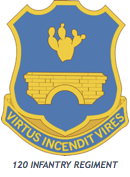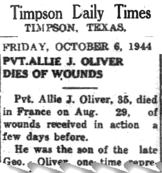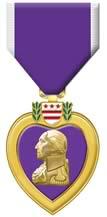 Private Allie Jennings Oliver
Private Allie Jennings Oliver
World War II - United States Army
“Died of Wounds”
June 16, 2022 - Allie Jennings Oliver was born in the east Texas town of Center, the county seat of Shelby on Thursday, September 30, 1909. His parents Katie Lee Dorman and George Fields Oliver were married there on January 17, 1904. Allie had four siblings, Katy Lee (1904), Georgia (1906), Mattie Lou (1912) and George Nathan (1923). His father George was elected county tax collector in 1904 and served in the state legislature in 1910. He also owned and edited the Champion Newspaper and the Center Daily News in 1911-1912. Tragically on February 24, 1923, he was killed before brother George’s birth when his team of mules became frightened and he was thrown from the wagon loaded with wood and run over.(1)
When Allie was seventeen years old the family moved to Beaumont, Jefferson County, Texas where he attended Lamar College (now University) and received a law degree from the East Texas College of Law.(2)
At age 32, Allie complied with the Selective Service Act of 1940 and registered for the first peacetime military draft in the history of the United States on October 16, 1940 in Beaumont. His registration card showed that he was living at 2210 Sabine Pass Avenue, unemployed and stood six foot two inches tall, weighed 180 pounds with blue eyes and brown hair.(3)
With the Japanese attack on the Naval Facilities at Pearl Harbor, Hawaii, December 7, 1941, the United States found itself fighting a second world war on two fronts, Europe and the Pacific. On November 20, 1943 at the age of 34, Allie took the oath of enlistment in Houston, Texas and was assigned the Army serial # 38546166. Following basic training, he was assigned duty as an infantryman with Company E, 120 Infantry Regiment (Third North Carolina), of the 30 Infantry Division (Old Hickory).
 The Division arrived in Europe in June 1944, shortly after the Normandy invasion (D-Day). The German High Command was now prepared for a massive counter-offensive in an attempt to throw the allied Armies back into the sea. Hitler and his generals moved massive amounts of armor and infantry to the area of Mortain, France, 150 miles west of Paris. At H-Hour, August 7, 1944 the troops of the XLVII Panzer Corps rolled forward in Operation Luttich with the 2 SS Panzer Division headed directly for Mortain and Hill 317, a key terrain feature in the central sector of the attack. The 120 Regiment was dug in directly north of Mortain and set up a roadblock adjacent to Hill 317 and were responsible for destroying over 40 vehicles during the action and stopped the German onslaught in the area. On August 7 the roadblock and Hill 317 were surrounded and bypassed by the main body of German forces. The group surrounded on Hill 317, commanded by Capt. Reynold Erichson -- about 700 men -- were protected by a ring of artillery fire from the 35th Infantry Division artillery and fighter-bomber sorties flown by the 2nd Tactical Air Force, RAF. This kept the Germans from taking Hill 317 and stopped the momentum of the counterattack in the area on the first day. The 35th Infantry Division, attacking the German penetration from the southwest, relieved the besieged troops at noon on August 12. In one of the outstanding small-unit achievements of the war in Europe, the defenders held out for six days, sustained 300 casualties, but denied the enemy a key objective. For their valiant actions on Hill 317, the 120th Infantry Regiment was awarded a Presidential Unit Citation.(4)
The Division arrived in Europe in June 1944, shortly after the Normandy invasion (D-Day). The German High Command was now prepared for a massive counter-offensive in an attempt to throw the allied Armies back into the sea. Hitler and his generals moved massive amounts of armor and infantry to the area of Mortain, France, 150 miles west of Paris. At H-Hour, August 7, 1944 the troops of the XLVII Panzer Corps rolled forward in Operation Luttich with the 2 SS Panzer Division headed directly for Mortain and Hill 317, a key terrain feature in the central sector of the attack. The 120 Regiment was dug in directly north of Mortain and set up a roadblock adjacent to Hill 317 and were responsible for destroying over 40 vehicles during the action and stopped the German onslaught in the area. On August 7 the roadblock and Hill 317 were surrounded and bypassed by the main body of German forces. The group surrounded on Hill 317, commanded by Capt. Reynold Erichson -- about 700 men -- were protected by a ring of artillery fire from the 35th Infantry Division artillery and fighter-bomber sorties flown by the 2nd Tactical Air Force, RAF. This kept the Germans from taking Hill 317 and stopped the momentum of the counterattack in the area on the first day. The 35th Infantry Division, attacking the German penetration from the southwest, relieved the besieged troops at noon on August 12. In one of the outstanding small-unit achievements of the war in Europe, the defenders held out for six days, sustained 300 casualties, but denied the enemy a key objective. For their valiant actions on Hill 317, the 120th Infantry Regiment was awarded a Presidential Unit Citation.(4)
 It was during this fighting that Private Allie Oliver was wounded in action and later died of those wounds on August 29, 1944 at the age of 34. He was then buried in a temporary military cemetery in France. His comrades would continue the fight, participating in the Rhineland, Ardennes-Alsace and Central Europe Campaigns until victory was declared in Europe, May 8, 1945. Following the war the 120 Regiment was inactivated at Fort Jackson, South Carolina on November 24, 1945. For his service Prive Oliver was awarded posthumously the Combat Infantryman Badge, Purple Heart, Distinguished Unit Citation, Army Good Conduct Medal, American Campaign Medal, European African Middle Easter Campaign Medal with 1 bronze service star and the World War II Victory Medal.
It was during this fighting that Private Allie Oliver was wounded in action and later died of those wounds on August 29, 1944 at the age of 34. He was then buried in a temporary military cemetery in France. His comrades would continue the fight, participating in the Rhineland, Ardennes-Alsace and Central Europe Campaigns until victory was declared in Europe, May 8, 1945. Following the war the 120 Regiment was inactivated at Fort Jackson, South Carolina on November 24, 1945. For his service Prive Oliver was awarded posthumously the Combat Infantryman Badge, Purple Heart, Distinguished Unit Citation, Army Good Conduct Medal, American Campaign Medal, European African Middle Easter Campaign Medal with 1 bronze service star and the World War II Victory Medal.
 With the Japanese unconditional surrender in the Pacific, World War II ended on September 2, 1945 and in the days that followed many American families had to make what was no doubt an extremely tough and heart wrenching decision. To leave their loved ones buried with their comrades in permanent American military cemeteries established on land donated by liberated countries or bring their remains back to the United States for reburial in the cemetery of their choice. Beginning in 1947, a program for the repatriation of bodies was initiated and families were given the choice. His mother Katie wanted her son to come home as did approximately 60% of other families facing the same decision.(5)
With the Japanese unconditional surrender in the Pacific, World War II ended on September 2, 1945 and in the days that followed many American families had to make what was no doubt an extremely tough and heart wrenching decision. To leave their loved ones buried with their comrades in permanent American military cemeteries established on land donated by liberated countries or bring their remains back to the United States for reburial in the cemetery of their choice. Beginning in 1947, a program for the repatriation of bodies was initiated and families were given the choice. His mother Katie wanted her son to come home as did approximately 60% of other families facing the same decision.(5)
It did not happen overnight as the return of over 171,000 war dead was a massive undertaking. Although undocumented the remains of Allie Oliver would have arrived on a troopship at Brooklyn, New York with many other fallen Americans. A memorial service would have taken place within a few days with services conducted by a Protestant, Catholic and Jewish Chaplain. A speech would have been given by a high ranking military or government official, a military band would have played and Taps would have been sounded to close out the service. From the Port of Brooklyn, Allie’s body with a military escort would have departed by train for the final leg of the journey home. Arriving in Center the train would have been greeted by grieving family, friends, citizens and fellow veterans. One of the local veteran’s organizations, VFW or American Legion or both would have provided Final Military Funeral Honors at Fairview, Cemetery, Center, Texas where Allie now rests with his parents. Brother George also served and survived World War II. Day is done, God is nigh. Day is done, God is nigh.
“That these dead shall not have died in vain”…..Abraham Lincoln
Sources:
(1). "Well Known Citizen Meets Tragic Death on Saturday," The Champion, February 28, 1923, reprinted in Mildred Cariker Pinkston, Obituaries of Early Pioneers, Shelby County, Texas, Center: Center Printing Co., 1983, I:222
(2). Molloy, T. J. Timpson Daily Times (Timpson, Tex.), Vol. 43, No. 197, Ed. 1 Friday, October 6, 1944, newspaper, October 6, 1944; (https://texashistory.unt.edu/ark:/67531/metapth765089/: accessed August 28, 2021), University of North Texas Libraries, The Portal to Texas History, https://texashistory.unt.edu; crediting Timpson Public Library.
(3). National Archives at St. Louis; St. Louis, Missouri; WWII Draft Registration Cards for Texas, 10/16/1940-03/31/1947; Record Group: Records of the Selective Service System, 147; Box: 1119
(4). https://www.nationalguard.mil/Resources/Image-Gallery/Historical-Paintings/Heritage-Series/Battle-of-Mortain/
(5). (2) “Repatriation Program.” Accessed February 13, 2021. http://www.in-honored-glory.info/html/repatriation.htm.








